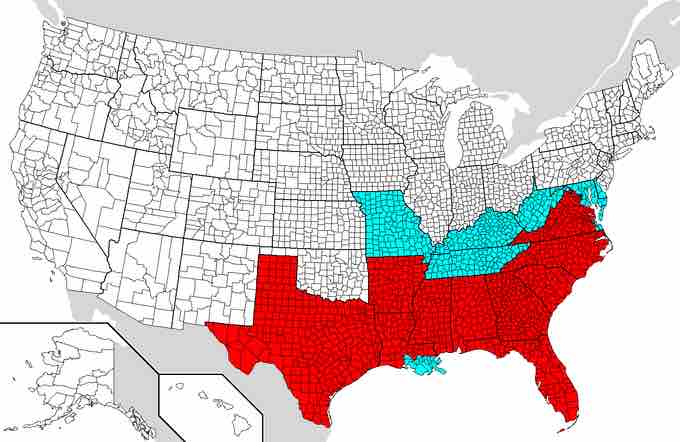The Emancipation Proclamation was an executive order issued by U.S. President Abraham Lincoln on January 1, 1863, during the American Civil War using his war powers. It proclaimed the freedom of slaves in the 10 states then in rebellion, applying to 3.1 million of the 4 million slaves in the United States at that time. The Proclamation immediately freed 50,000 slaves, with nearly all of the rest of the 3.1 million freed as Union armies advanced. The Proclamation did not compensate the owners, outlaw slavery, or grant ex-slaves, called "freedmen," citizenship.

States covered by the Emancipation Proclamation
Areas covered by the Emancipation Proclamation are shown in red. Slaveholding areas not covered are shown in blue.
On September 22, 1862, Lincoln issued a preliminary proclamation that he would order the emancipation of all slaves in any state of the Confederate States of America that did not return to Union control by January 1, 1863. None returned, and the order, signed and issued January 1, 1863, took effect except in locations where the Union had already mostly regained control. The Proclamation made abolition a central goal of the war, outraged white Southerners who foresaw in the Proclamation the potential for race wars, angered some Northern Democrats, energized antislavery forces, and weakened resolve among Europeans who wanted to intervene to aid the Confederacy.
Many immigrants in the North viewed the freed slaves as competition for already scarce jobs and as the reason the Civil War was being fought. Due in large part to this fierce competition for labor opportunities, the poor and working-class Irish Catholics generally opposed emancipation. When the draft began in the summer of 1863, they launched a major riot in New York City that was suppressed by the military, as well as much smaller protests in other cities. Many Catholics in the North had volunteered to fight in 1861, sending thousands of soldiers to the front and taking high casualties, especially at Fredericksburg; their volunteering fell off after 1862. Sentiment among German Americans was largely antislavery, especially among Forty-Eighters. Hundreds of thousands of German Americans volunteered to fight for the Union.
President Lincoln and other Republicans were concerned that the Emancipation Proclamation would be seen as a temporary war measure because it was solely based upon Lincoln's war powers. The Proclamation did not free any slaves in the border states or make slavery illegal.
The Thirteenth Amendment to the U.S. Constitution officially outlawed slavery and involuntary servitude, except as punishment for a crime. It was passed by the Senate on April 8, 1864 and by the House on January 31, 1865, and adopted on December 6, 1865. On December 18, 1865, Secretary of State William H. Seward proclaimed the amendment to have been adopted. It was the first of three reconstruction amendments adopted after the American Civil War.